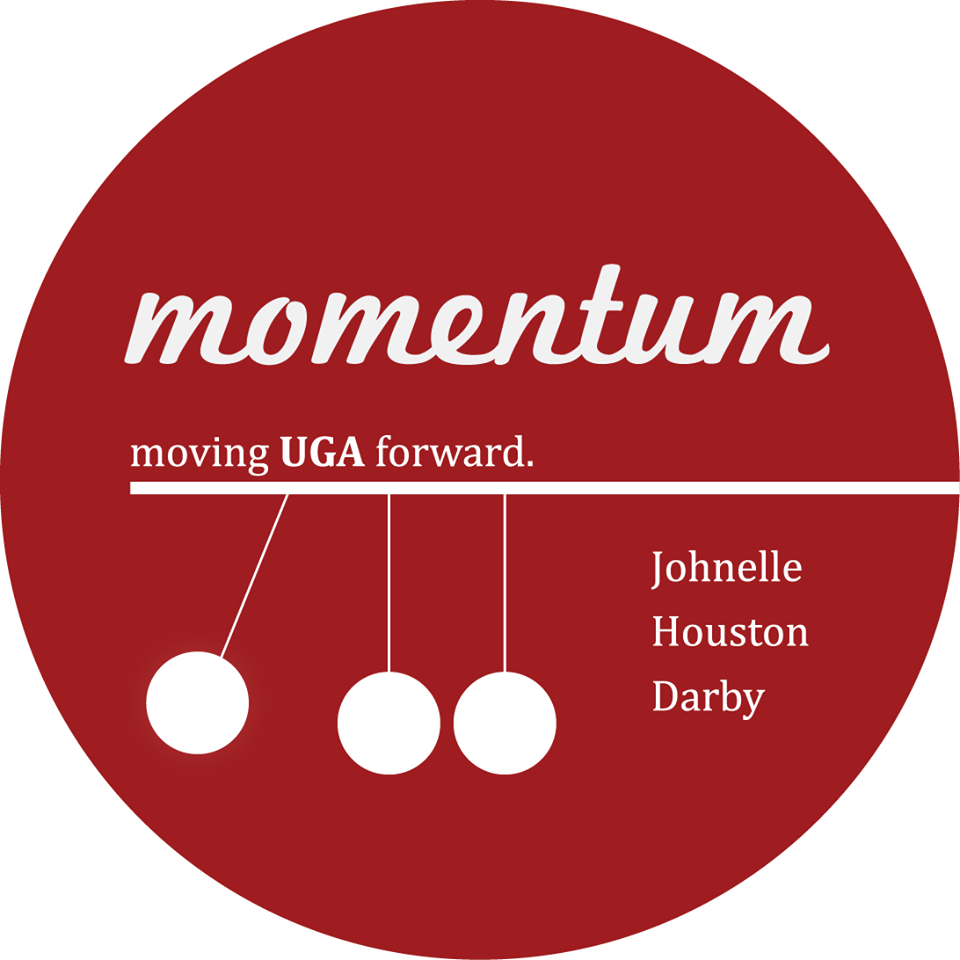By: Patrick Wheat
Voting for next year’s batch of Student Government Association (SGA) representatives begins today. Two tickets – Embark UGA and Reach UGA – are vying for executive positions. GPR Associate Editor and SGA watcher Patrick Wheat sat down with the candidates to learn who they are, what their ideas are, and how they will lead the students of UGA.
The Embark ticket features Austin Laufersweiler, a third year political science and communications studies major student running for President, Uzma Chowdhury, a third-year political science, English and Spanish major running for Vice President and Mary Grace Griffin, a third year public relations major running for Treasurer.
Tell me in 50 words or less, What is Embark about?
UC: Embark is about a journey with the destination being a culture change to end apathy.
AL: Embark is about service to students that matter and ensuring that we pursue policies that affect as many students as possible in a positive way.
MGG: To kinda go off of what Uzma said, Embark is about creating a culture change through awaking possibilities, the idea of something tangible that students can see through SGA and to make sure SGA provides a service that enriches the lives of students while they are here.
When you are talking about a culture change, what sort of change are you hoping for with your campaign?
UC: I think that SGA for the longest time for many students has not been something that has been really important, which you can see in the really low voter turnout rates for SGA elections. One of the aspects of that, I believe, is a lack of accountability. I don’t think students think that SGA is accountable and that means that the administration does not take SGA seriously because if the students aren’t taking SGA seriously, then the administration will not pay attention to it. Part of our platform delves into making SGA more accountable. How do we make SGA into something people are able to access. And part of that is me on the ticket, representing the general voice that shows someone who has never been in SGA being able to come in and get passionate about this school. Culture change is not just specific to SGA, but also to awakening passion within students because when you care about something, thats when you find out who you really are and who you are really about. You can get involved in things that make your experience at UGA much better and much stronger overall and help you figure out the direction you are going to take in your life on your journey.
AL: And I just want to add on that that it is important that this culture change happens now because we do have very important administrator turnover with a new President and a new Vice-President for Student Affairs. We feel that this is the best time to start this journey and take advantage of these new relationships that we will be forming and ensuring that they are of unprecedented strength.
Uzma, you have already brought up the fact you are an outsider who has worked more with other organizations than with SGA. How do you feel that helps you be a better candidate versus someone who has been involved with SGA?
UC: When you are involved in an organization for a long time, it is really easy to overlook the failures because you don’t want to say something bad about something you have been a part of. So, not only do I bring a fresh perspective, I also bring a part of the student body who is passionate, who is involved, but who has never felt a connection between the student voice and SGA and the administration. I want SGA to be that connection, to be that venue, and I really believe that with this new turn over in administration and a ticket that is passionate about making SGA something that is relevant again, something that is really there to come to the students. Instead of deciding what the students need, the SGA we will build will listen to what the students tell us they need. I think that an external perspective is really key in that vision, not only making a statement about a culture change, but also really enforcing those ideas that we all share.
In your platform, culture change is obviously a major plank of your ticket, discussing new ideas about how SGA could be run. One of the things that Embark has been advocating is restructuring SGA. How do you want to do that and why do you think that it is important?
AL: It is important because we believe that if you are going on a journey, you need an efficient vehicle. Our voice, our SGA, is our vehicle towards culture change. We want to make sure that vehicle is truly up to speed. Right now, SGA addresses issues based on area of campus. We believe that instead of by area, SGA should address issues by function, have one area for policy, one for programming and one for our new idea of “Student Services”. Additionally, we want to increase the accountability between the branches of SGA. We want the Senate to be able to hold hearings about the Executive Branch to increase accountability.
UC: We are putting shackles on ourselves because that is what needs to happen.
AL: Exactly, so we essentially are making our time more difficult to prove that we will be held accountable, we will be transparent and institute the function of being able to demand answers from us. In turn, we will be holding the Senate accountable. We will be making sure that Senators do things like office hours to make themselves as available to their constituents as possible, making sure they follow up on their platforms. To make sure our two branches are working together, we are being held accountable and so will they. And we want to put these changes in place to make that happen.
UC: Additionally, we want to hold the administration accountable. I think part of student government is being the voice of student concerns to the administration. We would like to enforce some kind of sanctions on the administration in the event that something we really passionately care about was ignored. We don’t want students who have passionately fought for something to fall flat and be ignored. That’s something that is very important to us as a ticket and we feel that to ensure that passion doesn’t fall flat we have to hold the administration accountable somehow. For example, the University Council has a lot of student voices on it in the form of student senators. If SGA disagrees strongly with something that the administration is doing, we can ask the senators to not attend, meaning they can not reach a quorum. That is one possibility and of course platforms are developing and changing and we are open to change because we are open to the student voice.
Another main point of your platform is the Student Engagement Plan. What is that and why are you advocating it?
AL: The Student Engagement plan would be achieved in cooperation with many different agencies on campus, so the bottom line is that we are coming from this idea of ending apathy and if you look at sporting events, if you look at campus safety, you could even look at academics, these are areas where students are not as engaged as they could be. We want to create a coalition of people developing a long term plan to address these issues so we can do things like have higher attendance at sporting events beside football, and to give more attention to many different areas on campus. Ideally, this will help many more students become invested in organizations. You would have students participating in new and innovative ways and engaging themselves so they are maximizing their opportunities in college and allowing themselves new ways to grow so they can get the most from their university experience.
MGG: And developing that plan comes from the realization that our time at UGA has been as a result of the sacrifices of the students who have come before us. So, we understand that we have one year in SGA administration, but we love this university to the point that we want our plan, that we want our vision, to continue on even after we are long gone from UGA. So that’s why we are creating the framework for that plan because we do have this strong love for this campus and we accept that Rome wasn’t built in a day and neither will this.
We are now in the final week of campaigning with voting starting on Monday. How do you feel you are doing so far? How has your platform been received in the past couple of days?
AL: It has been so much fun and it is such a roller coaster. You have your highs and your lows, but in general I am extremely proud of everything we have done. We have an amazing group of people behind us and I am honored to pursue this office with this outstanding group of people. This has been a unparalled life experience for me, and people have come out in waves to contribute. I feel like if we are trying to end apathy, this campaign by itself has started to do that.
MGG: What I always say about this campaign is that it has been such a humbling experience, first and foremost for me. To see the kind of people who are coming out and dedicating their time and energy and making all these sacrifices without asking for anything in return, knowing they might not get any recognition for their work but still doing it because they believe in us and they belive in what they stand for, it is mind blowing to me and it makes me want to work even harder for them.
UC: One of the major aspect of this campaign is that we have a lot of people working on our campaign who are external and who have never been involved with SGA, and going back to what Austin said, that shows how Embark already is enforcing these great cultural changes in what we want UGA to see, and going back to what Mary Grace said, this is not something that is not a platform. We don’t have a checklist we are checking off. We aren’t trying to brand our names into monuments. We don’t care if we get the recognition, or if a lot of our work is not attributed to us. For us, it is all about the students, and we just want people to embark. Not about us, but with us to a better university.
Voting begins March 25 and and ends on March 28. Log into Oasis using your UGA MYID to vote for President, Vice-President, Treasurer, and school Senators.

